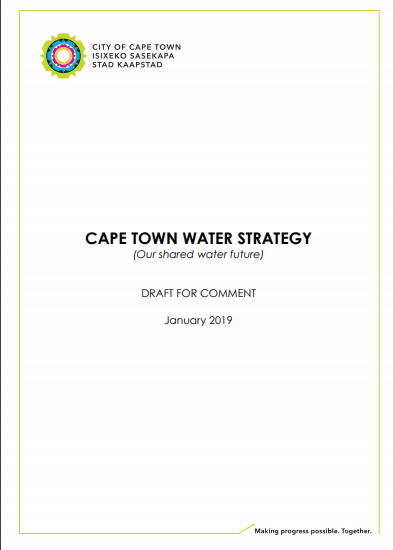City of Cape Town publishes Draft Water Strategy for public comment
- February 14, 2019
- Posted by: Elaine Coles
- Category: Africa

The City of Cape Town’s Draft Water Strategy has today opened for public comments and recommendations. The primary purpose of this strategy is to ensure that the city will be more resilient to future droughts.
The Draft Water Strategy articulates the City’s plan to ensure greater water security over the next 10 years as it moves towards being a water-sensitive city
Given that new surface water resources are limited, in future, a greater proportion of Cape Town’s water demand will be met from alternative sources including groundwater, water re-use and desalination
Based on scenario analysis, the City is committing to increasing available capacity by more than 300 million litres per day over the next ten years.
However, Cape Town will continue to rely on rain-fed dams for most of its water, which is much cheaper than alternative supply sources
The City’s commitment is to transform Cape Town over time into a more resilient and water-sensitive city. This will be done through new incentives and regulatory mechanisms as well as the way the city invests – in consultation with residents.
Following a process of intensive engagement, a Draft Water Strategy has been prepared for Cape Town’s residents for consideration and feedback. The public participation process gives residents until 15 March 2019 in which to scrutinize the City’s plans to prepare for water security and to share their constructive views on it.
“The recent drought was a harsh lesson for us all”
Councillor Xanthea Limberg, Mayoral Committee Member for Water and Waste commented:
“The recent drought was a harsh lesson for us all. This strategy is the product of extensive work conducted by the City in consultation with a range of local and international experts in the field of water, and has been created to protect Cape Town from the harsh effects of drought in the future, and we aim to do everything possible to avoid the implementation of such severe water restrictions again. “
“We have to be prepared for the likelihood of increasing risk and vulnerability in the coming years in the face of climate change, the growth of alien vegetation, delays in building new surface water schemes, and over-allocation of the integrated water system.”
The Strategy’s aim and vision is that Cape Town will be a water-sensitive city by 2040 – achieved by optimizing and integrating the management of water resources to improve resilience, competitiveness, livability and sustainability to ensure the prosperity of all residents.
Councillor Limberg continued:
“A water-sensitive city is a place that will attract people to live and work, and for business to invest. It is a place that will provide a range of different water sources incrementally for a variety of uses. Additionally, it is a place where residents are equipped with the knowledge to enhance our conservation and protection of this vital resource through practical behaviour changes such as being mindful of pollutants and chemicals we use and dispose of into the system.”
“We have now entered a time characterized by great uncertainty, where previous models for weather predictions and associated planning can no longer be relied upon. I have great confidence in the strategy and would like to encourage all residents to engage with it during this period, and share their considered inputs. Water supply and demand must be reconciled to ensure that there is sufficient water available to meet anticipated demand.”
Cape Town will continue to rely on rain-fed dams for most of its water
Even though the City will invest in alternative sources of water, rain-fed dams will continue to supply over three-quarters of the water to Cape Town in ten years’ time.
Based on scenario analysis, the City commits to increasing available capacity by more than 300 million litres per day over the next ten years. The strategy outlines a programme for achieving this, which includes the removal of alien vegetation from catchments, the incremental introduction of desalination, use of groundwater and increasing the scale of water re-use.
The current indicative cost of this programme is R5,4 billion and it is adaptable and robust when tested against the different scenarios (including a step change in rainfall – a possible reality of climate change). The build programme will reduce the likelihood of severe water restrictions in future.
‘It is possible, and even likely, that the additional more expensive supplies of water (such as reuse and desalination) may not be used all of the time. But this will not have been wasteful expenditure. The future is uncertain and the cost of very severe restrictions is much higher than the cost of insuring against this likelihood by providing additional water supply capacity,’ said Cllr Limberg.
One of the major successes in 2018 for the City and its people was surviving the worst drought to ever affect Cape Town without actually running out of water. A range of measures, including the massive savings efforts by residents, ensured that the taps were never turned off.
Click here to download the Draft Strategy
